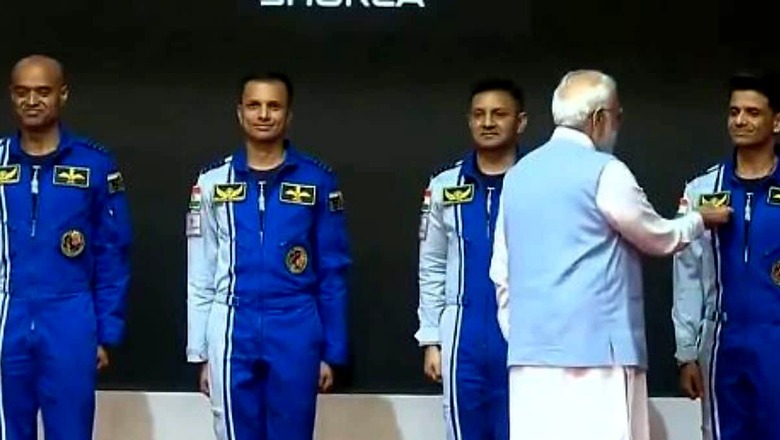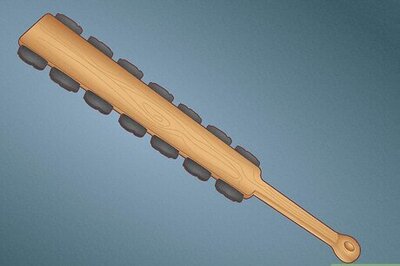
views
They won’t go boldly where no Indian has gone before (that first belongs to Wing Commander Rakesh Sharma), but India’s four space astronauts will certainly go the furthest any Indian has gone in a “made in Bharat” spacecraft.
In Kerala, Prime Minister Modi pinned “astronaut wings” on the sculpted chests of a quartet of Air Force pilots (Prashanth Balakrishnan Nair, Angad Prathap, Ajit Krishnan, and Shubhanshu Shukla) who will rocket into space late this year as part of the Gaganyaan mission.
After the ceremony, Modi turned to his attentive audience in the cavernous auditorium of the Vikram Sarabhai Space Centre and intoned that the astronauts “are not just 4 names or 4 human beings, they are the four powers that are going to take the aspirations of 140 crore Indians to space. An Indian is going to space, after 40 years.”
When the tryst with low Earth orbit happens, India’s space agency will be inevitably hailed for its enviable ability to take a great leap for mankind on a shoestring budget.
Just a few months ago when India became the first ever nation in history to land on the moon’s south face, almost all commentators fixated on India’s frugal $2-billion space budget — a fraction of the four other countries that have landed on the moon. The United States and China have exponentially bigger space spends at $62 billion and $12 billion respectively.
There was also of course the obligatory reference to ISRO’s early days when its scientists, clearly fired up by nothing more than a Promethean instinct (it certainly wasn’t the piffling salary), would transport rocket parts on their bicycles.
But if India’s space programme must compliment Bharat’s great power aspirations as Modi hopes, he will need to provide it generous outlays to wean it off the endearing “jugaad-fied” ingenuity that has brought it this far.
Here are 5 reasons that this investment is needed.
First, executing highly visible “techno-scientific” initiatives has historically served as symbols of power, modernity, and status. Just spare a thought, splitting the atom did for the United States what the printing press did for the European Enlightenment.
Second, equipping ISRO with the financial tools it needs to conduct cutting-edge research will allow Bharat to dominate and dictate the pace and direction of global innovation. History has shown that innovators inherit the Earth.
Third, investing in India’s space programme will only enhance ease of living. Those who whinge about “precious resources” being diverted towards “vanity projects” when there are mouths to feed at home forget that the allocations have boosted ease of living. ISRO’s satellites have helped farmers predict weather patterns to alter cropping patterns and avoid crop failures. ISRO’s satellites monitor damage from natural disasters to help the state design fixes that go on to save lives. They bring telemedicine and telecommunication to remote rural areas. Time and again it has been proven that connecting people to their governments and through them to precious resources helps in improving lives.
Fourth, India needs to build new space travel platforms that can help it compete against global rivals that are eyeing an inestimably gigantic resource pie-in-the-sky. Indeed, a Forbes magazine report points out that near-Earth asteroid mining is set to become a gazillion-dollar industry. The magazine predicts, growing “venture interest” in “mining asteroids for scarce commercial resources including cobalt, iron, and nickel, as well as precious metals—gold, silver, and platinum— and even water”. India needs to leapfrog its space technology to be able to land humans on interplanetary objects and get them back safely.
Space tourism alone is expected to generate a sizable $850 billion by 2030. Getting tourists safely into orbit and back to Earth is set to become as de-jure as driving a car from destination A to B. Can India afford to lag in this leisure segment?
Last, but not least, spending on space research will grow jobs that in turn will inculcate a scientific temperament among youth wanting those jobs. India can reverse the direction of the precious brain drain that has thus far benefitted its great power rivals.
“Space is hard” as is often said but so is maths. Practice makes perfect but practice doesn’t come cheap.
















Comments
0 comment